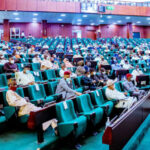The Governor of the Central Bank of Nigeria (CBN), Godwin Emefiele, has proposed a post-COVID-19 economic recovery path, saying the pandemic presents opportunities for the country.
He said the economic recovery strategy spanning three years will be biased towards mass employment and wealth creation in the country focusing on four main areas, namely, light manufacturing, affordable housing, renewable energy, and cutting-edge research.
The CBN Governor made the proposition in an article titled “How Nigeria can turn the COVID-19 tragedy into an opportunity.”
He said, “once the world returns to some new normal, having tamed COVID-19 by a combination of vaccines and social distancing, and the Nigerian economy reopens fully for business, we will act quickly to enable faster recovery of the economy by targeted measures towards particular sectors that are able to support mass employment and wealth creation in the country.”
In manufacturing, for instance, he said “it is pertinent to note that Nigeria’s gross fixed capital formation is currently estimated at N24.55 trillion made up residential and non-residential properties, machinery and equipment, transport equipment, land improvement, research and development, and breeding stocks.”
“Of this estimated value, machinery and equipment, which are the main inputs into economic production, are currently valued at only N2.61 trillion,” he explained.
In order to pursue a substantial economic renewal, including replacement of at least 25 percent of the existing machinery and equipment for enhanced local production, he estimated that at least N662 billion worth of investments to acquire hi-tech machinery and equipment.
Therefore, he assured, “the CBN will consider an initial intervention of N500 billion over the medium term, specifically targeted at manufacturing firms to procure state-of-the-art machinery and equipment and automated manufacturing models that would fast-track local production and economic rejuvenation, as well as support, increased patronage of locally processed products such as cement, steel, iron rods, and doors, amongst several other products.”
Emefiele explained further that “the recent private sector investments in cement production using enhanced technology and automated manufacturing models is a good example of the kind of economic renewal we will be pursuing in this phase.”
“We will develop a thorough screening process and stringent criteria for equipment types that would qualify for funding under this phase,” he added.
The CBN Governor said in “order to boost job creation, household incomes and economic growth, we will focus our attention on bridging the housing deficit in the country by facilitating government intervention in three critical areas: housing development, mortgage finance, and institutional capacity.
“We will pursue the creation of a fund that will target housing construction for developers that provide evidence of profiled off-takers with financial capacity to repay.”
“The current identification framework in the banking sector using the bank verification number (BVN) will be used to verify the information provided by the off-takers before the developer can access the funds.
“We will consider ways to assist the Mortgage Finance sub-sector as well as build capacity at the State levels for their land administration agencies to process and issue land titles promptly, implement investment-friendly foreclosure laws and reduce the cost of land documentation, as these have remained major inhibiting factors in the provision of affordable housing in the country.”
“Over the next 3 years, we will also support the financing of environmentally friendly energy production, as this has a tangential long-term health benefits. We will look at efforts to drive innovation and research in every sector, through our universities, research institutions, creative industry initiatives, and all other media of novelty and inventions.”
On medical care, he said Nigeria must now envision and work toward a Nigeria with the cutting edge medical facilities to provide world class care to the sick and vulnerable, enable our universities and research institutions to provide the requisite education and training that is required to keep these ecosystems functioning sustainably and efficiently and millions of Nigerians employed in meaningful and well-paying jobs.
“This is the Nigeria that we must aspire to build he concluded,” he added.
The CBN governor also said after the pandemic, which will definitely change the world, countries may continue to look inwards and globalization as we know it today may be dead for a generation.
“Therefore, as a nation, we cannot afford to continue relying on the world for our food, education and healthcare.
“The time has come to fully transform Nigeria into a modern, sophisticated and inclusive economy that is selfsufficient, rewards the hardworking, protects the poor and vulnerable, and can compete internationally across a range of strategic sectors” he noted.
In order to achieve this goal, he said we must begin immediately to support the Federal Government to: “Build a base of high quality infrastructure, including reliable power that can engender industrial activity;
“Support both smallholder and large scale agriculture production in select staple and cash crops;
“Create an ecosystem of factories, storages, and logistics companies that move raw materials for value-added production, and finished goods to markets;
“Use our fiscal priorities to create a robust educational system that enables critical thinking and creativity, which would better prepare our children for the world of tomorrow;
“Develop a healthcare system that is trusted to keep all Nigerians healthy, irrespective of social class;
“Facilitate access to cheap and long-term credit for Small and Medium-Scale Enterprises (SMEs) and large corporates;
“Develop and strengthen pro-poor policies that bring financial services and security to the poor and the vulnerable; and expedite the development of venture capitalists for nurturing new ideas and engendering Nigerian businesses to compete globally.”

 Join Daily Trust WhatsApp Community For Quick Access To News and Happenings Around You.
Join Daily Trust WhatsApp Community For Quick Access To News and Happenings Around You.

